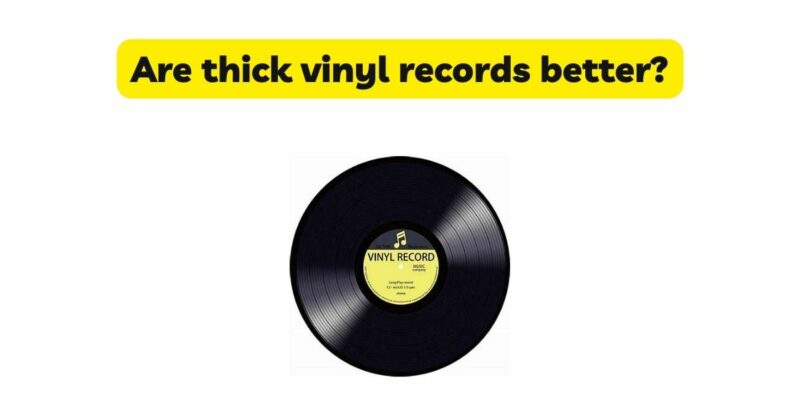Thick vinyl records have gained attention in the world of vinyl enthusiasts, with claims that their increased weight and thickness result in superior sound quality and durability. However, it is essential to critically examine whether thick vinyl records truly offer a better listening experience compared to their thinner counterparts. In this article, we will delve into the topic, exploring the potential benefits and drawbacks of thick vinyl records. By considering factors such as sound quality, durability, pressing techniques, and market preferences, we aim to provide a comprehensive understanding of the perceived advantages and potential limitations of thick vinyl records.
- Sound Quality Considerations: a) Groove Depth and Dynamics: Proponents of thick vinyl argue that the increased groove depth allows for greater dynamics and potentially improved sound quality. The deeper grooves provide more physical space for the stylus to track, resulting in potentially enhanced audio reproduction, especially in capturing low-frequency information. b) Reduced Surface Noise: Thicker vinyl records may exhibit reduced surface noise due to their increased mass and stability. The added thickness can help mitigate vibrations and resonances, resulting in a quieter playback experience.
- Durability and Warping Resistance: a) Structural Stability: Thicker vinyl records are often perceived as more robust and less prone to warping. The increased thickness can offer greater rigidity, minimizing the risk of warping due to heat, improper storage, or environmental factors. This durability can contribute to a longer lifespan and improved playback consistency. b) Enhanced Flatness: Some argue that thicker records are less susceptible to slight warps or unevenness, resulting in a flatter playing surface. This flatness can reduce potential tracking issues and improve overall playback quality.
- Manufacturing Techniques and Pressing Quality: a) Enhanced Quality Control: Thicker vinyl records may indicate a higher level of manufacturing precision and quality control. The additional weight and thickness can require stricter tolerances during the pressing process, ensuring more accurate reproductions of the original master recordings. b) Potential for Better Mastering: The increased thickness of the vinyl can potentially provide mastering engineers with more headroom and finer control over the cutting process. This can result in improved dynamics and clarity, enhancing the overall sonic experience.
- Market Preferences and Collectibility: a) Audiophile Appeal: Thick vinyl records are often marketed as premium or audiophile-grade releases, appealing to collectors and enthusiasts seeking the highest sound quality. These releases often command higher prices and are associated with meticulous mastering and pressing techniques. b) Collectible Editions: Thick vinyl records are sometimes chosen for limited or collector’s editions to enhance the perceived value and exclusivity of the product. Collectors may appreciate the unique characteristics and aesthetics associated with thicker pressings.
- Potential Drawbacks and Limitations: a) Increased Shipping and Storage Weight: Thick vinyl records are heavier than their thinner counterparts, resulting in higher shipping costs and potentially requiring sturdier storage solutions. This can be a practical consideration for individuals with large record collections or limited storage space. b) Compatibility with Certain Tonearms: The increased thickness of some records may pose compatibility issues with certain tonearm setups, especially those designed for lighter or more flexible tracking force settings. It is important to ensure that the turntable and tonearm can accommodate thicker records without compromising performance or causing excessive wear on components.
Conclusion: The debate surrounding the superiority of thick vinyl records is subjective and multifaceted. While some listeners swear by the potential sonic benefits and durability of thicker pressings, it is crucial to approach the topic with a balanced perspective. Thick vinyl records may offer advantages such as improved sound quality, increased durability, and enhanced collectibility. However, it is important to consider factors such as manufacturing techniques, pressing quality, and market preferences when assessing the value of thick vinyl records. Ultimately, the quality of the music, mastering, playback equipment, and personal preferences should be the primary factors influencing one’s vinyl collection choices. Whether one prefers thicker or thinner vinyl records, the joy of the vinyl experience lies in the music itself and the appreciation of the format’s unique characteristics.


